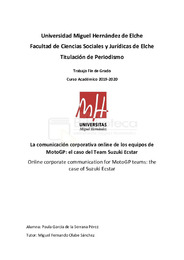Por favor, use este identificador para citar o enlazar este ítem:
https://hdl.handle.net/11000/25851Registro completo de metadatos
| Campo DC | Valor | Lengua/Idioma |
|---|---|---|
| dc.contributor.advisor | Olabe Sánchez, Miguel Fernando | - |
| dc.contributor.author | García de la Serrana Pérez, Paula | - |
| dc.contributor.other | Departamentos de la UMH::Ciencias Sociales y Humanas | es_ES |
| dc.date.accessioned | 2022-02-11T08:51:14Z | - |
| dc.date.available | 2022-02-11T08:51:14Z | - |
| dc.date.created | 2020-09-04 | - |
| dc.identifier.uri | http://hdl.handle.net/11000/25851 | - |
| dc.description.abstract | El auge de la comunicación online y del consumo de información en redes sociales, es consecuencia directa del desarrollo de las nuevas tecnologías y de las actuales tendencias comunicativas. Esta predisposición a consumir contenido en la red ha provocado que muchas organizaciones incrementen su presencia en internet y desarrollen estrategias más potentes para fidelizar a sus públicos y para reforzar su identidad corporativa. En el mundo del deporte ha supuesto una auténtica revolución para las instituciones y para los deportistas. El motociclismo, en concreto los equipos del Mundial de MotoGP, han evolucionado notablemente en cuanto a tácticas para lanzar sus mensajes a los seguidores y a los espectadores del campeonato. Este trabajo tiene como objetivo analizar en profundidad la comunicación online del Team Suzuki Ecstar, con especial énfasis en sus redes sociales (Twitter, Instagram y Facebook) y su página web oficial. Asimismo, la investigación ha tenido en cuenta el efecto de la pandemia mundial del Covid-19 que paralizó el comienzo de la competición. Para estudiar a fondo la cuestión, se ha entrevistado en profundidad mediante cuestionario a dos de los miembros del Departamento de Comunicación del equipo, y se ha realizado un análisis de contenido de las redes sociales corporativas: Facebook, Twitter e Instagram y de su página web. Para ello, se ha seleccionado un periodo temporal que abarca dos semanas, la primera sin actividad deportiva y segunda en la que se disputó el Gran Premio de la República Checa. Los resultados de la investigación permiten concluir que durante las semanas de carreras la afluencia de contenido posteado incrementa notablemente en las redes sociales, entre las que según Alberto Gómez (Manager de Marketing y Comunicación) y Adriana Pinto (Asistente de Marketing), destaca Instagram. Además, la crisis del coronavirus afectó directamente a la creación de contenido y al plan de comunicación previamente planteado, teniendo que recurrir a la creación de nuevos posts, que, según Adriana y Alberto, estuvieron centrados sobre todo acercar el lado más familiar del equipo a los seguidores. Sus principales objetivos fueron potenciar en el engagement y generar un diálogo bidireccional con los aficionados | es_ES |
| dc.description.abstract | The boom in online communication and the consumption of information on social networks is a direct consequence of the development of new technologies and current communication trends. This predisposition to consume content on the net has led many organizations to increase their presence on the Internet and develop more powerful strategies to build up the loyalty of their audiences and to reinforce their corporate identity. In the world of sport, it has meant a real revolution for institutions and athletes. Motorcycling, specifically the MotoGP World Championship teams, has evolved considerably in terms of tactics for reporting their messages to fans and spectators of the championship. This work aims to analyze in depth the online communication of Team Suzuki Ecstar, with special emphasis on its social networks (Twitter, Instagram, and Facebook) and it's official website. Taking into account the effect of the global pandemic of the Covid-19 that paralyzed the start of the competition. To study the issue in depth, three of the team's Communication Department members have been interviewed and data has been collected about the publications on the profiles of the various platforms, selecting a period covering 14 days, a week without sporting activity and another week in which the Czech Republic Grand Prix was held. The results of the research lead to the conclusion that during race weeks the influx of posted content increases significantly on social networks, especially Instagram. Also, the coronavirus crisis directly affected the creation of content and the previously proposed communication plan, having to resort to the creation of new posts focused mainly on engagement and a bidirectional dialogue with followers | es_ES |
| dc.format | application/pdf | es_ES |
| dc.format.extent | 43 | es_ES |
| dc.language.iso | spa | es_ES |
| dc.publisher | Universidad Miguel Hernández de Elche | es_ES |
| dc.rights | info:eu-repo/semantics/openAccess | es_ES |
| dc.rights | Attribution-NonCommercial-NoDerivatives 4.0 Internacional | * |
| dc.rights.uri | http://creativecommons.org/licenses/by-nc-nd/4.0/ | * |
| dc.subject | comunicación online | es_ES |
| dc.subject | redes sociales | es_ES |
| dc.subject | motociclismo | es_ES |
| dc.subject | imagen corporativa | es_ES |
| dc.subject | coronavirus | es_ES |
| dc.subject | online communication | es_ES |
| dc.subject | social networks | es_ES |
| dc.subject | motorcycling | es_ES |
| dc.subject | corporate identity | es_ES |
| dc.subject.other | CDU::0 - Generalidades.::070 - Periódicos. Prensa. Periodismo. Ciencias de la información | es_ES |
| dc.title | La comunicación corporativa online de los equipos de MotoGP: el caso del Team Suzuki Ecstar | es_ES |
| dc.title.alternative | Online corporate communication for MotoGP teams: the case of Suzuki Ecstar | es_ES |
| dc.type | info:eu-repo/semantics/bachelorThesis | es_ES |

Ver/Abrir:
TFG-García de la Serrana Pérez, Paula.pdf
1,66 MB
Adobe PDF
Compartir:
 La licencia se describe como: Atribución-NonComercial-NoDerivada 4.0 Internacional.
La licencia se describe como: Atribución-NonComercial-NoDerivada 4.0 Internacional.
.png)